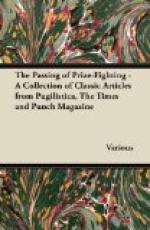* * * * *
[Illustration: Hawker (to lady who is in bitter need of fuel). “EAGER AS I AM, MADAM, TO EXPLAIN THE MERITS OF THESE LOGS AT FOURTEEN SHILLINGS A HUNDRED, I CANNOT IGNORE THE NOTICE EMBLAZONED ON YOUR GATE, AND THEREFORE WISH YOU A VERY GOOD DAY.”]
* * * * *
A BUY ELECTION.
[The excellent precedent set by Mr. MALLABY-DEELEY in supplying needed goods at cheap rates may prove a little awkward if adopted by Parliamentary Candidates, as shown in the following anticipatory report.]
Quiet confidence reigned in the ranks of the Muddleboro Labour Party. The action of their Candidate, Mr. Dulham, in arranging for a co-operative milk supply at sixpence per quart, was supposed to have won the hearts of all householders. They had no fear of Mr. Coddem, the representative of the great BOTTOMLEY party. It was true that Mr. Coddem had taken over a local brewery and was supplying beer at threepence per pint. But the Labour stalwarts argued that, in the first place, this would lose him the women’s and temperance vote, and, in the second place, the electors would drink the brewery dry in double-quick time. All those who failed to get cheap beer would revenge themselves on the Candidate who had failed to keep his promise.
The Wee Free cause was nearly hopeless. Their candidate, Mr. Guff, had made a desperate bid for popularity by offering, in conjunction with The Daily News, cocoa at reduced rates. But the Labour Candidate had put the pointed question, “Who made cocoa dear in the first place?” and Mr. Guff had evaded the question.
When Mr. Stilts, the National Party Candidate, promised the public cheaper honours—urging that, if he were returned, it would be unnecessary to subscribe to party funds to get a title—the voters were quite unmoved. Perhaps they knew that they could get the O.B.E. for nothing, anyhow, and had no higher ambitions.
The Coalition Candidate, Mr. Jenkins, alone said nothing. The Star, that famous organ of the Anti-Gambling Party, proclaimed triumphantly that the odds offered in the constituency were ten to one against Jenkins. But Mr. Jenkins lay low and said nothing. Or rather he achieved the not impossible feat in a Parliamentary contest of saying nothing and saying a good deal.
But the day before the poll Mr. Jenkins’s polling cards were delivered. They were headed, “Vote for Jenkins and Kill Profiteering. Give up this card at your polling-station for free samples of silks in my great blouse offer. I sell for 9s. 11-3/4d. a blouse usually priced at two guineas. Not more than six sold to any one voter. OUT SIZES NO EXTRA CHARGE.”
A quarter-mile queue of lady-voters was standing outside the polling booths at eight o’clock. Hundreds of them had their husbands in custody with them. In vain were representations of the Full Milk Jug and the Flowing Pint Pot paraded before them. The Wee Free procession, headed by a Brimming Cocoa Cup, was received with jeers.




